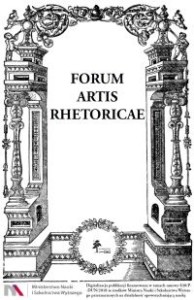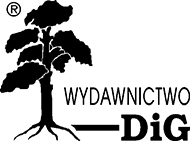Lector Benevole!
Numer obecny, który powstał w związku z IV Kongresem Dydaktyki Polonistycznej
(Poznań, 20–23 listopada 2019), przynosi artykuły, z których każdy ukazuje, jak zastosować
retorykę w procesie dydaktycznym przede wszystkim w szkole (acz zawarte
tu uwagi można przenieść i do dydaktyki szkoły wyższej).
Numer otwiera informacja nt. Kongresu, a także program kongresu oraz program
warsztatów.
Dział Artykułów zawiera kilka istotnych prac. Pierwszą z nich jest studium
Bruce’a McComiskeya Post-truth Rhetoric and the Functions of Education (Retoryka
post-prawdy i funkcje edukacji), który wskazuje, jak zastosować narzędzia retoryki,
aby nauczyć uczniów rozróżniania fake-newsów od prawdziwych informacji.
Tekst Adama Mazurkiewicza Literatura popularna w dydaktyce szkolnej. Propozycja
(Popular literature in school didactics. Proposal) pokazuje, jak można wykorzystać
literaturę popularną w dydaktyce szkolnej.
Teksty Józefa Marii Ruszara Instytut Literatury a współczes na szkoła (Institute
of Literature and modern school) oraz Wizerunki człowieka i Boga w literaturze polskiej
ostatnich stu lat [Images of God and Man in Polish Literature (Last Hundred
Years)] zawiera informacje i na temat działań podejmowanych przez Instytut Literatury
na rzecz szkół, a też omawia szalenie ważną serię wydawniczą: Wizerunki
człowieka i Boga w literaturze polskiej ostatnich stu lat oraz sposób wykorzystania
jej w edukacji literackiej.
Tekst Katarzyny Grabias-Banaszewskiej Lubuski Konkurs Literacki jako przykład
dobrych praktyk w obszarze edukacji polonistycznej (sprawozdanie), [(Lubuski
Konkurs Literacki as an example of good practice in the fi eld of Polish language
education (report)] omawia bardzo interesującą inicjatywę na rzecz zarówno edukacji
polonistycznej, jak i umiejętności pisania.
Z tekstem Bruce’a McComiskeya bardzo dobrze koresponduje artykuł Jakuba
Z. Lichańskiego By uczyć się pisania od mistrzów pióra, czyli lektury szkolne
jako wzorce wypowiedzi argumentacyjnej. Jak budować wywód argumentacyjny:
kilka spostrzeżeń (How learn writing from the masters of the pen, or school readings
as the patterns of argumentative expression. How to build argumentative essay:
a few insights), który poświęcony jest praktycznym wskazówkom, jak wykorzystać
lektury szkolne do praktycznego nauczania tworzenia esejów argumentacyjnych
i, szerzej, wypowiedzi o charakterze argumentacyjnym.
Dział Recenzji i Przeglądów, krótkie wprowadzenie do szalenie interesującej
książki Bruce’a McComiskeya Post-Truth Rhetoric and Composition (2017) oraz
poradnik metodyczny Framework for Success in Postsecondary Writing.
Drugą pozycją jest książka Mateusza Machaja, „Gwiezdne wojny” a fi lozofi a polityki,
Warszawa 2019, która pokazuje, jak ważkie treści można „wydobyć” z popularnego
fi lmu s.f., i jak może on być przydatny nie tylko na lekcjach języka
polskiego.
Ten dział zamyka przypomnienie najważniejszych artykułów związanych
z tematem numeru, które wcześ niej publikowaliśmy na łamach „Forum Artis
Rhetoricae”.
Redaktorzy wyrażają nadzieję, iż pismo, tak jak dotąd kwartalnik, będzie służyć
integrowaniu środowiska miłoś ników retoryki oraz propagowaniu tej wspaniałej
nauki. Zawsze jednak w duchu Platońskiej idei kalokagathia.
Kind Reader!
Th e present number, which was created in connection with the IV Congress
of Didactics of Polish Philology (Poznań, November 20–23, 2019), brings articles,
each of which shows how to apply rhetoric in the didactic process primarily
in school (although the remarks included here can be transferred and didactics
of the university).
Th e number opens with information about Congress and the Program
of the Congress and the Program of the Workshops.
Th e section DISSERTETIONS brings several important works. Th e fi rst
of these is the study of Bruce McComiskey Post-truth Rhetoric and the Functions
of Education (Retoryka post-prawdy i funkcje edukacji), which shows how to apply
the tools of rhetoric, to teach students to distinguish the fake-news from the real
information.
Th e article by Adam Mazurkiewicz Literatura popularna w dydaktyce szkolnej.
Propozycja (Popular literature in school didactics. Proposal) shows how you can use
popular literature in school teaching.
Th e articles by Józef Maria Ruszar Institute of Literature and modern school
(Instytut Literatury a współczes na szkoła) and Images of God and Man in Polish
Literature (Last Hundred Years) (Wizerunki człowieka i Boga w literaturze polskiej
ostatnich stu lat) it contains information on the activities undertaken by the Institute
of Literature for schools and also discusses the extremely important publishing
series of books from the series: Images of Man and God in Polish literature
of the last hundred years and how it can be used in literary education at school.
Th e article by Katarzyna Grabias-Banaszewska Lubuski Konkurs Literacki
jako przykład dobrych praktyk w obszarze edukacji polonistycznej (sprawozdanie),
(Lubuski Konkurs Literacki as an example of good practice in the fi eld of Polish
language education (report) discusses a very interesting initiative for education
in Polish literature but also writing skills.
Th e article by Bruce McComiskey corresponds to the article by Jakub Z. Lichański
How learn writing from the masters of the pen, or school readings as the patterns
of argumentative expression. How to build argumentative essay: a few insights
(By uczyć się pisania od mistrzów pióra, czyli lektury szkolne jako wzorce wypowiedzi
argumentacyjnej. Jak budować wywód argumentacyjny: kilka spostrzeżeń),
which is devoted to practical tips on how to use school reading to practice teaching
the preparation of argumentative essays and, more broadly, argumentative
statements.
Th e section Reviews brings a short discussion with report of a book by Bruce
McComiskey Post-Truth Rhetoric and Composition (2017) and Framework for
Success in Postsecondary Writing,
Th e second item is the book by Mateusz Machaj, Th e Rise and Fall of the First
Galactic Empire: „Star Wars” and Political Philosophy, Wrocław 2019, which shows
how important content can be „extracted” from the popular SF fi lm and how
it can be useful not only in the Polish language lessons.
Th is section ends by recalling the most important — according to the Editorial
Board — materials previously published in the magazine and related to the subject
of Rhetoric and education
Th e editors express the hope that the journal, as it has been so far, will serve to
integrate the rhetoric enthusiasts’ community and to propagate this great science.
Always, however, in the spirit of the Platonic idea of kalokagathia.
Jakub Z. Lichański
Editor-in-Chief
ID.0000-0002-1943-5069



 62 (2020)
62 (2020)
